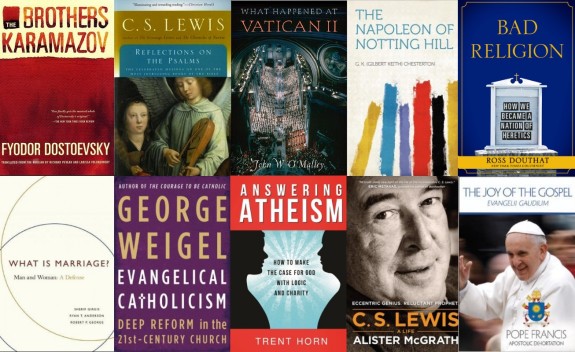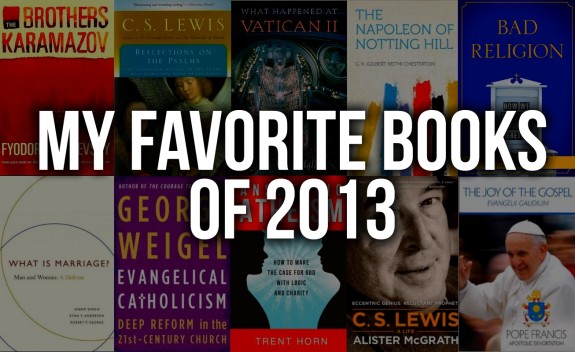This has been a great reading year for me. I knocked out 64 books (see the complete list here) including a good mix of theology, philosophy, fiction, and even a few classics. It wasn’t easy to narrow my favorites down to top ten.
Before sharing my list, though, I’ll add my annual caveat: these are not this year’s most acclaimed books, nor the most timeless or best-written. Some weren’t even published in 2013. They’re simply my personal favorites, the books I read and liked best, the ones I kept thinking about well after finishing.
PS. Here are my favorite books from past years:
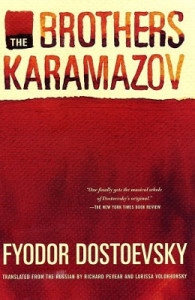 10. The Brothers Karamazov
10. The Brothers Karamazov
by Fyodor Dostoyevsky
Farrar, Straus and Giroux, 796 pages, paperback
Originally released in November 1880
After deciding to start this classic back in 2011, I only finished it this year. As for many readers, the deep and probing novel illuminated for me the war between sin and grace, the apparent fissure between the goodness of God and a world marked by pain and loss, and the shocking beauty that emerges out of even the most dysfunctional families. Dostoyevsky’s insights into human psychology and resilient love still flash through my mind, long after finishing.
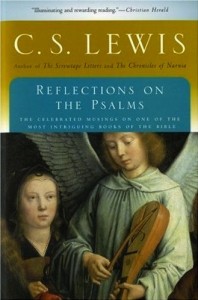 9. Reflections on the Psalms
9. Reflections on the Psalms
by C.S. Lewis
Mariner Books, 168 pages, paperback
Originally released in 1958
This year I continued to read through Lewis’ corpus and his slim book on the Psalms emerged as my favorite. Though Lewis was not a theologian or biblical scholar—in fact he begins this book by admitting, “This is not a work of scholarship.” —Lewis was an accomplished expert in literature and an underrated poet. Here he applies those gifts to the Psalms, first exploring the more “repellent” verses, those concerning judgment and curses, before reflecting on the more upbeat, imaginative lyrics that compose most of the biblical collection. The result is a gem that shines new light on familiar hymns, and inspires you to read the Psalms anew.
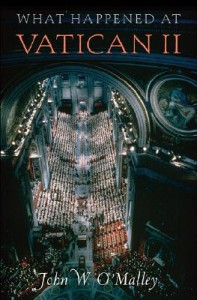 8. What Happened at Vatican II
8. What Happened at Vatican II
by John O’Malley
Belknap Press, 400 pages, paperback
Released on October 1, 2010
On the fiftieth anniversary of Vatican II, I asked many bibliophile friends which one-volume introduction to the Council they’d recommend. Almost everyone pointed to this book, and now I see why. O’Malley has a gift for tying together the wide and varied strands of theological debate, political posturing, and spiritual insight into a compelling narrative. His careful, linear account oscillates between on-the-ground anecdotes and sweeping, general trends, which together help any Council novice, like me, to grasp the full scope and significance of this momentous event.
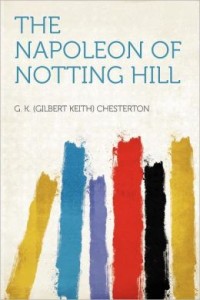 7. The Napoleon of Notting Hill
7. The Napoleon of Notting Hill
by G.K. Chesterton
Dover, 208 pages, paperback
Originally released in 1904
I really enjoyed this short and unsung novel by G.K. Chesterton—the first he ever wrote—because it embodies so many classic Chestertonian themes: the extraordinary hidden in the ordinary; the seriousness of fun (for “joy is the serious business of heaven,” as Lewis reminded); and the sanity of Distributism, on display as simple men rally to defend their piddling land from greedy industrialists for the simple reason that it is theirs. The book is admittedly surreal, filled with medieval heraldry and kingships decided by lottery, but that’s what gives it color. Read this book to see Chesterton’s whimsical brilliance play out through story.
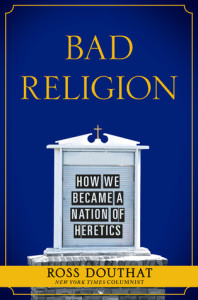 6. Bad Religion: How We Became a Nation of Heretics
6. Bad Religion: How We Became a Nation of Heretics
by Ross Douthat
Free Press, 352 pages, hardcover
Released on April 17, 2012
According to Ross Douthat, a gifted New York Times columnist, Americans are not becoming less and less religious. We’re simply becoming less orthodox. Tracing our downward religious spiral from last century’s golden age, led by Archbishop Fulton Sheen, Martin Luther King, Jr., and Billy Graham, to today’s fashionable blend of prosperity gospel (Joel Osteen), self-help cults (Oprah), and the spiritual-but-not-religious boon (Elizabeth Gilbert), Douthat shows how we’ve arrived at a watered-down faith that “strokes our egos, indulges our follies, and encourages our worst impulses.” If you want to understand the trends that have shaped our religious landscape, this is your book.
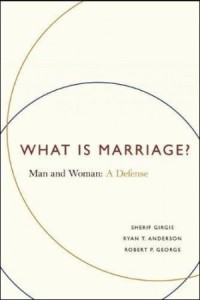 5. What Is Marriage? Man and Woman: A Defense
5. What Is Marriage? Man and Woman: A Defense
by Sherif Girgis, Ryan T. Anderson, Robert George
Encounter Books, 152 pages, paperback
Released on December 11, 2012
After co-authoring the most downloaded academic paper in the history of the Internet, these three intellects expanded their arguments into a book-length treatise with the same title. The result, in my view, is the clearest and most cogent philosophical defense of marriage today (evidenced by its reference in recent Supreme Court decisions.) Anyone seeking to understand why the state should promote man-woman marriage as the ideal, and why we can’t seriously debate the “same-sex marriage” issue until we answer a more basic question—what is marriage?—should read this book.
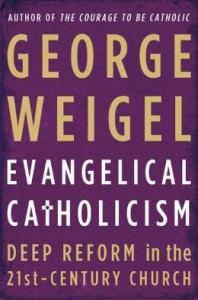 4. Evangelical Catholicism: Deep Reform in the 21st Century
4. Evangelical Catholicism: Deep Reform in the 21st Century
by George Weigel
Basic Books, 304 pages, paperback
Released on February 5, 2013
Perhaps no phrase appears more in Catholic circles today than “the New Evangelization,” but what does it mean and how should it shape the Church? That’s what George Weigel answers in this missionary manifesto. Weigel’s guide lays out a plan for applying the Church’s evangelical identity to the priesthood, the episcopacy, the liturgy, the laity, Catholic intellectual life, and even to the papacy. He calls for a more vibrant, reformed Church, devoted to holiness and mission, whose central focus is proclaiming Jesus Christ to the world. It’s an exciting and insightful glimpse at the Church of the New Evangelization.
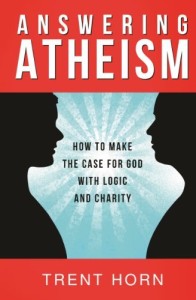 3. Answering Atheism: How to Make the Case for God with Logic and Charity
3. Answering Atheism: How to Make the Case for God with Logic and Charity
by Trent Horn
Catholic Answers, 335 pages, paperback
Released on September 28, 2013
With the increasing popularity of the New Atheists, and the growth of their many disciples, we’ve seen a whole slew of books designed to counter this trend. However, many of these books have glaring issues that make them difficult to recommend (either to theists or atheists.) Most are either too simplistic, too academic, too focused, too broad, or too caustic. Yet Trent Horn’s book strikes the right balance of breadth and depth, clarity and sophistication, charity and truth. His main project is to show there are no good reasons to embrace atheism while there are many reasons to accept theism. He defends these contentions with fair and accessible prose, copious endnotes, thick appendices, and helpful Socratic dialogues, which all make this my go-to recommendation for anyone wondering whether God is real.
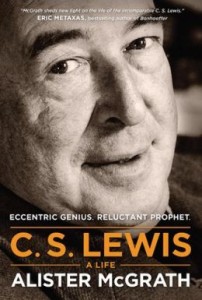 2. C.S. Lewis – A Life: Eccentric Genius, Reluctant Prophet
2. C.S. Lewis – A Life: Eccentric Genius, Reluctant Prophet
by Alister McGrath
Tyndale, 448 pages, hardcover
Released on February 18, 2013
To put it simply, I’ve read several C.S. Lewis biographies and Alister McGrath’s is the best. What makes McGrath so effective are his similarities to Lewis: both were born in Northern Ireland, both followed atheism throughout their adolescence, both attended Oxford, both became prestigious dons, and both converted to Christianity. This shared trajectory allows McGrath to get inside Lewis’ mind like few others. Even more, to ensure he understood his subject, McGrath read Lewis’ entire corpus chronologically before starting his biography. The resulting book covers the major events and figures in Lewis’ life, as expected, but McGrath approaches them primarily through Lewis’ books, which offer a fresh and illuminating gateway. Notably, McGrath also defends a new date for Lewis’ conversion to theism, setting it a year later than Lewis records in his own autobiography. This significant discovery, coupled with McGrath’s smooth and perceptive prose, should put this book at the top of every Lewis-lover’s list.
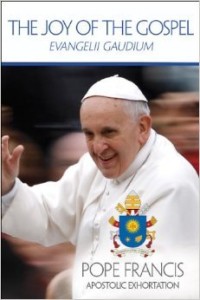 1. Evangelii Gaudium (The Joy of the Gospel)
1. Evangelii Gaudium (The Joy of the Gospel)
by Pope Francis
Word Among Us, 224 pages, paperback
Released on January 6, 2014
First of all, yes, this is a book. At over 50,000 words, it’s one of the longest papal documents on record. And second, what a remarkable book it is. In his first solo work, the Holy Father applies his characteristic themes of joy, evangelization, and mercy toward building a culture of encounter and a poor church for the poor. Touching on almost every aspect of Church life, the wide-ranging treatise addresses complacent Christians, dispirited missionaries, poor preaching, and oppressive social injustice, shimmering on every page with memorable one-liners and powerful summonses. Pope Francis recently called Evangelii Nuntiandi the “greatest pastoral document ever written.” In my view, his own joyful, vivid call to evangelization now deserves that title.
Honorable Mention
- Fill These Hearts: God, Sex, and the Universal Longing by Christopher West
- The Global War on Christians: Dispatches from the Front Lines of Anti-Christian Persecution by John Allen, Jr.
- The Man Who Was Thursday by G.K. Chesterton
- Race With the Devil: My Journey from Racial Hatred to Rational Love by Joseph Pearce
- Start: Punch Fear in the Face, Escape Average, and Do Work that Matters by Jon Acuff
Great Books I’m Still Reading
- Dark Passages of the Bible: Engaging Scripture with Benedict XVI and St. Thomas Aquinas by Dr. Matthew Ramage
- The Last Superstition: A Refutation of the New Atheism by Dr. Edward Feser
- Strange Gods: Unmasking the Idols in Everyday Life by Elizabeth Scalia

